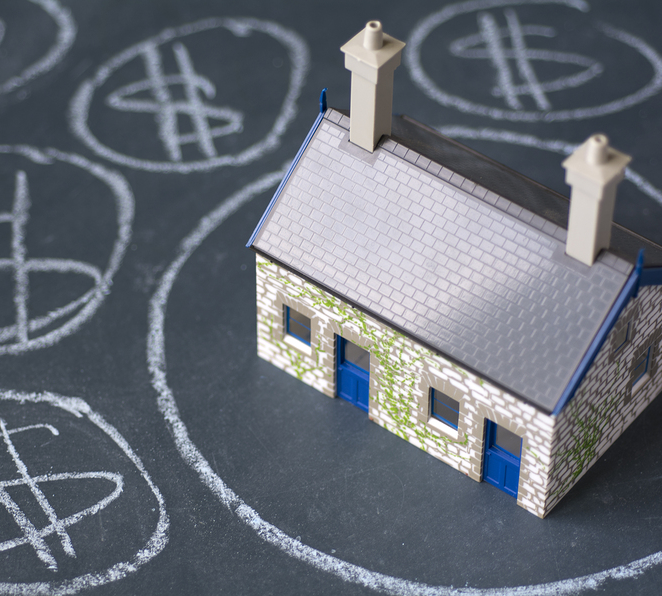Should You Pay Off Debt or Save For a House?

One of the most important things to do ahead of purchasing a home is to get your finances in check. A home is likely the biggest purchase of your life, so you need to be prepared. Furthermore, the better your finances and credit look, the better your chances are of getting approved and qualifying for the interest rate you want.
When is the best time to buy a home? Get a better idea by clicking here.
While your income, credit, and debt levels are important, you can’t overlook the importance of a solid down payment. However, with the majority of Americans having some sort of debt (whether it be a car loan, student loan, or consumer debt) many of us simply aren’t able to save up for the large down payment that we need.
Down Payment vs. Debt Repayment
As you could imagine, this can create problems. Should you pay off all of your debts first, then try to get a mortgage with a lower down payment, or save up a huge down payment while putting your debt repayment on the back burner?
While the ultimate decision you make will depend on your own wants and needs, we’re going to provide you with all the information you need to help you make the right choice for your unique situation.
Read this to find out how consumer debt can affect you.
How the Banks Decides How Much to Loan You?
First, we think it’s important that you understand how a lender decides whether you qualify or not and how they decide how large of a mortgage they are going to give you.
When you send in your application for a mortgage to a lender, there are a few things they consider when figuring out whether to accept you or not. They will look at your income, your savings, and how much debt you currently have. All of this together will help them understand how much money you would really be able to put towards a mortgage each month.
Click here to know what happens if you can’t afford to make your loan payments on time.
Based on what they find, the lender will decide the interest rate and size of the mortgage that you can qualify for. Generally, banks will take a certain percentage of your total income (often around 36%) and decide that is about how much you can pay toward your total debt (including mortgage) each month.
Do you already have a mortgage? Here’s how you can pay it off early.
Should You Pay Off Debt Or Save Up For a Home?
Now that you know a bit about the process that banks use to decide how much to loan you and how to figure out if you qualify, let’s discuss whether you should pay off debt (and have a smaller down payment) or save up for a big down payment (without paying off your debts).
Since lenders look at your total income and use it to calculate the amount that you would really be able to put toward your total debt, it makes the most sense to pay off all of your existing debt before applying, as it will give you the best chance at a larger loan amount.
Do you have bad credit? Here’s how you can buy a home.
Less Debt, More Mortgage
The reason for this is because existing debt will drastically reduce the amount of money that the bank believes you will be able to put toward your mortgage payment and other related payments. For example (according to the 36% we mentioned earlier), if a person makes $100k yearly and has no debt, lenders believe they will be able to put $36k towards their mortgage each year. However, if a person makes that same $100k, but has loans with annual payments of $24k, then they will only be able to put $12k towards a mortgage each year, so they won’t be given as large of a mortgage.
Therefore, in most cases, you should aggressively pay down your debt as best you can and then begin to save for a down payment. Even if you have a lower down payment and zero debt, you are likely to get a better mortgage than if you have a huge down payment, but lots of debt.
Looking for some debt solutions? Check this out.
Since there is no set amount of time you need to save for, so your decision will depend on how much you make and your regular expenses, such as rent, food, and other necessities.
Exceptions to the Rule
Of course, what would a rule be without exceptions? So, while it normally is smart to pay off all of your debt first and then save up a down payment, there are some reasons to wait to pay off your debt and go for the mortgage first.
Can You Lower Your Payments?
One thing to consider is whether or not you can lower your minimum payment requirements each month. This is because if you lower your debt payments each month, you will have more “debt space” available in the eyes of the lenders. Even if this is temporary, it should get you a better mortgage, without having to fully pay off all of your debts.
Learning to maintain an effective budget can also help.
Can You Avoid Mortgage Insurance?
Another situation where it makes sense to save for a down payment instead of paying off debt is when you are able to avoid paying private mortgage insurance. If you put up more than a 20% down payment, you usually can avoid it. So, if you can get to that magic 20% number relatively quickly, you should take advantage of it, as it could save you quite a bit of cash in the long term.
Do you need a large down payment?
If you don’t need a large mortgage, it also makes sense to save some for a down payment at the same time as you are paying off debts. That way you can save up enough for your modest mortgage quickly, while still bringing down your overall debt. This is a good place to be, but with how expensive most homes are across the country, it might not be viable for everyone.
To discover some ways of saving up for a down payment, look here.
Final Thoughts
It generally makes more sense to pay off debt first and then begin to save for a house. However, before you pay off any debt, you want to ensure that you have an emergency fund saved up, which should be equal to a few months worth of expenses. Just keep in mind, there are always exceptions to any rule and the choice that you make will be ultimately up to you. if you’re interested in knowing what your debt relief options are, click here.



